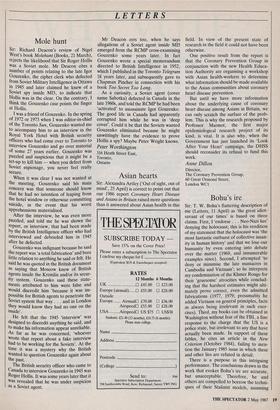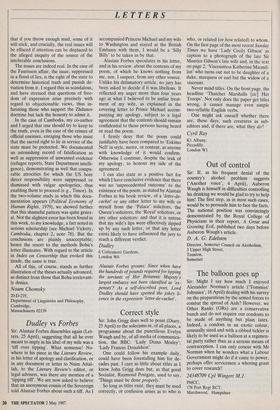Bohu's ire
Sir: T. W. Bohu's flattering description of me (Letters, 11 April) as 'the great idiot- savant of our times' is based on three claims. First, I 'endorse . . . Neo-Nazi lies' denying the holocaust; this is his rendition of my statement that the holocaust was 'the most fantastic outburst of collective insan- ity in human history' and that we lose our humanity by even entering into debate over the matter (1969, and innumerable examples since). Second, I attempted 'to deny or minimise the late massacres in Cambodia and Vietnam'; so he interprets my condemnation of the Khmer Rouge for their 'gruesome' atrocities while conclud- ing that the harshest estimates might ulti- mately prove correct, even the admitted fabrications (1977, 1979; presumably he added Vietnam on general principles, facts as always being irrelevant in such exer- cises). Third, my books can be obtained in Washington without fear of the FBI, a fine response to the charge that the US is a police state, but irrelevant to any that have actually been made. In support of these fables, he cites an article in the New Criterion (October 1984), failing to men- tion the January 1985 issue in which these and other lies are refuted in detail.
There is a purpose in this intriguing performance. The conclusions drawn in the work that evokes Bohu's ire are accurate, but unacceptable. Therefore, he and others are compelled to borrow the techni- ques of their Stalinist models, assuming
LETTERS
that if you throw enough mud, some of it will stick, and crucially, the real issues will be effaced if attention can be displaced to the alleged iniquity of the source of the intolerable conclusions.
The issues are indeed real. In the case of the Faurisson affair, the issue, suppressed in a flood of lies, is the right of the state to determine historical truth and punish de- viation from it. I regard this as scandalous, and have stressed that questions of free- dom of expression arise precisely with regard to objectionable views, thus in- furiating those who support the Zhdanov doctrine but lack the honesty to admit it.
In the case of Cambodia, my co-author and I urged that one should try to keep to the truth, even in the case of the crimes of official enemies, enraging those who insist that the sacred right to lie in service of the state must be protected. We documented an astonishing record of falsification as well as suppression of unwanted evidence (refugee reports, State Department intelli- gence), demonstrating as well that compa- rable atrocities for which the US bore direct responsibility were suppressed or dismissed with vulgar apologetics, thus enabling them to proceed (e.g., Timor). In the two-volume study in which this docu- mentation appears (Political Economy of Human Rights, 1979), we showed further that this shameful pattern was quite gener- al. Not the slightest error has been found in this work, to my knowledge, a fact noted in serious scholarship (see Michael Vickery, Cambodia, chapter 2, note 78). But the conclusions are plainly unacceptable; hence the resort to the methods Bohu's letter illustrates. With regard to the article in Index on Censorship that evoked this tirade, the same is true.
All of this, of course, stands as further illustration of the theses actually advanced, as distinct from those that Bohu irrelevant- ly denies.
Noam Chomsky
20-D-219, Department of Linguistics and Philosophy, Cambridge, Massachusetts 02139



















































 Previous page
Previous page